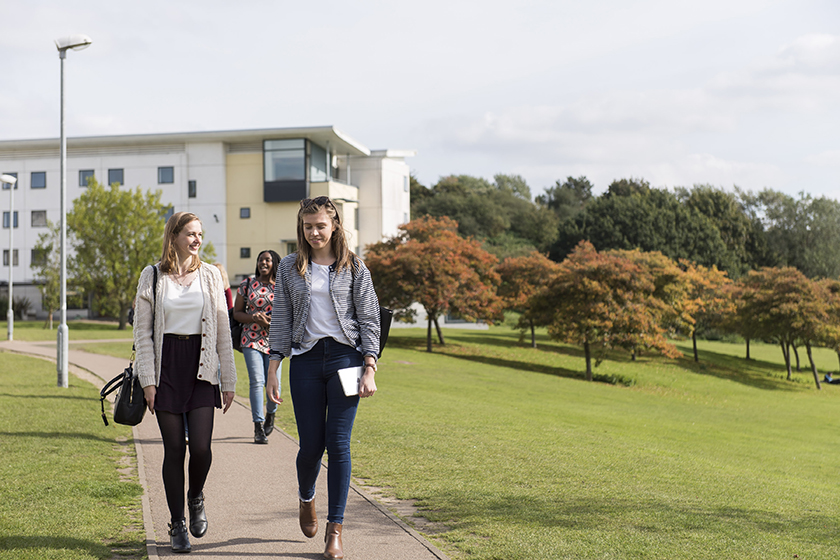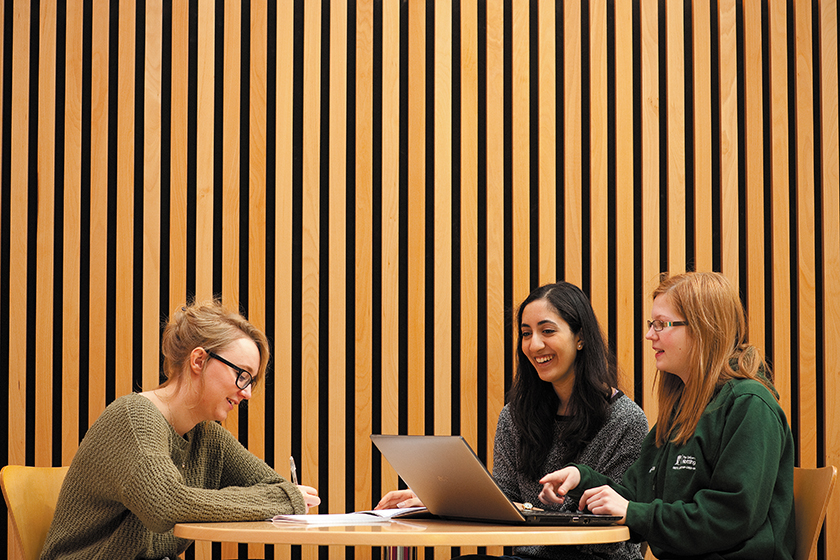Five Steps to Choosing the Right University
By
8 years ago
Javier Espinoza, education editor of the Daily Telegraph, advises school leavers to plan ahead

With a record numbers of students applying to go to university in the UK, it is more important than ever that students know how to find the right university and the right course.

According to University and College Admissions Service (UCAS) figures, the record number of applications has exceeded pre-tuition fee rise figures.
But with a growing number of universities and vocational and non-vocational degrees on offer, is it fair to say that students need to take a degree in applying for the right degree course?
In the past the focus was on Oxford, Cambridge and Russell Group universities. Now the options available are far greater, with a plethora of smaller British universities specialising in niche subjects. There are even more English-speaking universities on the continent – France and Germany are not the only countries offering a growing number of courses taught in English. American universities have also become more competitive, with the rise in tution fees at home, but are still a great deal more expensive – so the investment needs to pay off.
Before starting the process, it pays for students to follow through the steps below.
1. Ask yourself, why do I want to go to university?

St Andrew’s University
‘The process of university selection should start with an insightful reflection on why they want to go to university in the first place,’ says Sir Anthony Seldon, vice-chancellor of Buckingham University and former head of the independent senior school, Wellington College.
‘Far too many people go to university at 18 or 19 without any clear idea about why. There are students who shouldn’t go to university at all after school, or perhaps a couple of years later when they have travelled or worked and know what they want to do. The more conscious students are about why they are going to university, the more they will get from it, and the more likely they are to get onto their chosen course.’
Certain subjects are highly competitive. If a student wishes to study law or medicine, for example, they will need to be very focused throughout their education, as there will be special requirements. ‘Medicine is extremely competitive,’ explains Oliver Ridley, head of sixth form at King’s College Taunton. ‘Students need a string of A*s at GCSE and A-level, good UKCAT and BMAT scores and work experience in a healthcare environment, as well as a good knowledge of the profession.’
Top law courses are also in high demand. Ridley advises work experience and suggests aspiring lawyers should get involved in debating and public speaking competitions. ‘That said, great grades and a top LNAT score are what make the difference.’
2. Shop around at university open days

University of East Anglia
Recent evidence has suggested that the earlier pupils start thinking about university destinations, the more likely they are to be successful. Seldon suggests children should start thinking about it in Year 9, and start visiting universities straight after their GCSEs.
In his view, open days are a good place to start shopping around for universities and university courses.
‘It is very helpful because it gives young people a sense of the place. University can be a lonely place, which is why so many people drop out – but it’s important that students challenge themselves at university and don’t to fashionable Russell Group universities for the sake of it.’
The Russell Group, which includes Oxford and Cambridge, are highly regarded by employers because of their academic robustness, but they are not the only group of prestigious British universities. University Alliance is a network of 19 universities created in 2006, which focuses on subjects like engineering and STEM courses. There are also so-called ‘new’ universities, a term used for former polytechnics and colleges, which have taken on the old giants by specialising in niche subjects, in some cases, extremely successfully. Although many are not allowed to award research degrees, future legislation is seeking to change that.
Regardless of the type or grouping of institution, Nicola Dandrige of Universities UK says:
‘It is worth making the time to visit all the universities you are interested in applying for. This is not just to enable you to get a better sense of what the university is like, but also because it allows you to speak with staff and students directly, and get a sense of the town, city and region in which the university is situated.’
3. Draw up a list of prospective universities

University of Nottingham
She advises young people to draw up a list of the universities they want to visit and then narrow it down to a manageable handful. Dandridge says candidates should also look at all the institutions that offer their course, so they have considered all the options. She says:
‘Make sure you look carefully, because what might appear to be the same course may actually vary substantially between different universities. Look at the course requirements and check that you are likely to be able to match the grades needed.’
Universities have worked hard in recent years to make sure that prospective students – and often, parents – are getting the right information about individual courses before they enrol. ‘But’, says Seldon, ‘they can only do so much. Students should think about whether they want a campus university versus a town university or a big versus a small university, to make the most of their experience.’
Students need not worry too much about entry thresholds. They shouldn’t prevent students from choosing the course they want most, regardless of where it is. ‘Focus on the course that really excites you,’ says Seldon. ‘This may dictate what career you follow. Thresholds can vary within universities, and because of tuition fees, students can find they are more relaxed as they need to fill the places. Thresholds are becoming less and less important.’
Jenny Brown, headmistress at St Alban’s High School for Girls, says the process of getting into university and choosing courses has changed beyond recognition in the last few years following the introduction of higher tuition fees.
‘It is a consumer’s market. Universities are pulling rabbits out of hats to woo the best candidates. Unconditional offers are enticing. As are the plethora of taster days and flexibile courses on offer that allow students to construct their own degrees out of any number of different modules.
4. Familiarise yourself with UCAS clearing

University of Stirling
The clearing process has changed too. The UCAS application process, used by universities to fill any spaces they have left for the new academic year, used to be seen as an undesirable place to be. However, in recent years, the number of Russell Group universities dropping grade requirements during clearing has increased, as they compete for students following a lift in the cap on the numbers institutions can recruit.
Sarah Macdonald, vice principal of Pearson College, London says that if used properly, ‘the clearing process is a good opportunity to step back and ensure that you make the right decisions about your future’.
But she warns a great deal of thinking and time needs to go into it.
‘Candidates should see themselves as “consumers” and understand the logic behind entering clearing. Not holding an offer and not making the grades are two reasons. But other school leavers enter clearing because their priorities and ambitions have changed. They want their choice of course and university to reflect this. Clearing may seem like a frantic rush but you will have a few days to reflect, so don’t jump into anything too quickly. Discuss your options with your teachers and parents, read course reviews online and try to visit the university to make sure you like it. £27,000 is a lot of money, so if you are going to go through clearing, make sure you think tactically and make the most of this opportunity. Remember, you’re the consumer so spend your money wisely.’
5. Consider the intrinsic value of university

University College London
To what extent should career prospects govern students’ thinking when selecting universities? Should they instead measure the quality of teaching, tutors’ research, the depth and breadth of courses, student welfare and the wider co-curricular and social opportunities available?
Brown does not believe that career ambitions should be the principle deciding factor. She warns that if it is, students may have to be flexible in their university choice. ‘New league tables throw up some surprising results when universities are ranked by employability. The top 23 gives pause for thought. Leeds is number three above LSE and Durham, while Aston, Lancaster, Cardiff, Cranfield, and City University, London all make it in above more conventionally celebrated Russell Group universities.’
‘Students should not just consider the “instrumental” but also the “intrinsic” value of a university’, says Brown.
‘The driving force must be the quality of the learning alongside intellectual and pastoral provision – these things combined should govern the choice of university. They are the best measures to apply when evaluating universities. And the best ways of ensuring that you will become the happy, well-educated successful person employers want in their workforce.’
Her concern is that, over time, the changes in university entrance procedures may have a long-term impact on the quality of British universities and their standing in the world, ‘but, in the short term, things look bright for A-level students. If they do well, they can afford to be picky and if things go wrong at A- level, there is usually a way through.’
The benefits of thinking ahead

University of Aberdeen
Sixth-form students who have successfully completed the process of applying to university say the key is to get as much help as possible from their school and to be very organised in the process. Brown acknowledges that teenagers looking to go to university ‘are increasingly savvy about course and institution selection’, but that schools are vital in supporting them.
Caroline Rosenzweig, a sixth-form student at The Mount, York, who is going to study engineering at MIT in America, said: ‘The Mount really helped me through applications. There is a common application where you fill in everything and they give it to each university that needed information and long references from the school.
‘To anyone else thinking of doing this, I would advise them to start early, especially for the SATs. They are time consuming and you should do them at a time that does not conflict with your A-level studies. Stay organised and manage your time.
‘I knew that if I spent the time to get good results, I would never have to re-sit. And yes, it did pay off.’
RESOURCES: UCAS/ Universities UK/ The Russell Group/ University Alliance



